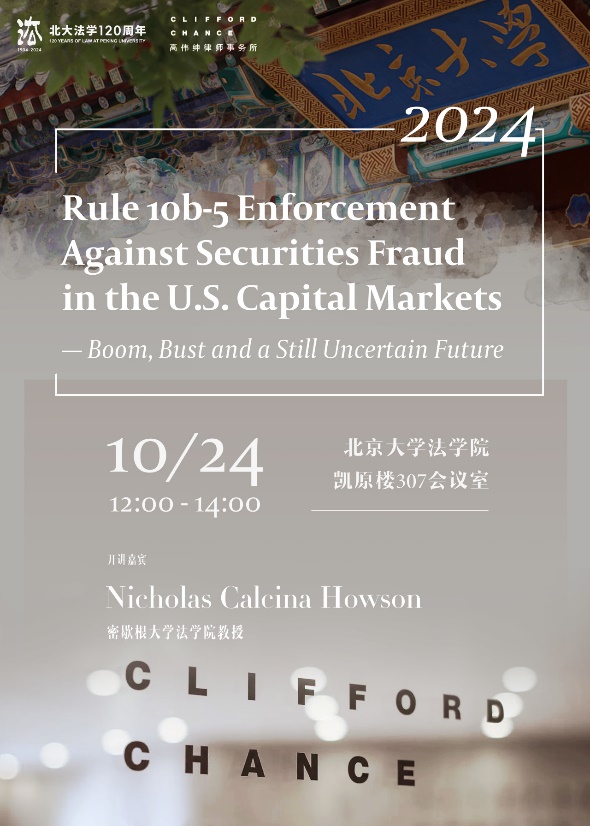网投十大信誉排名以强大的国内外师资和科研团队为依托,于2014年创立“Global & Comparative Law”系列课程项目。国际知名法律学者和高端实务人士开设全英文的全球化与比较法律课程和前沿讲座,使北大法学院学生加深了对全球化与法治的理解,开拓了国际化视野和法律思维,增进了国际化法律知识储备,提升了处理国际化法律实务的实践能力。

主题:Rule 10b-5 Enforcement Against Securities Fraud in the U.S. Capital Markets--Boom, Bust and... a Still Uncertain Future
时间:2024年10月24日(周四)12:00-14:00
地点:北大法学院凯原楼307会议室
主持人:戴昕 网投十大信誉排名副院长、长聘副教授
开讲学者:Nicholas Calcina Howson 美国密歇根大学法学院教授
开讲学者简介:
Nicholas Calcina Howson is a Professor of Law at the University of Michigan Law School.A former partner of Paul, Weiss, Rifkind, Wharton & Garrison LLP, he worked out of that firm's New York, Paris, London and Beijing Offices.During this time, he acted for clients in precedent-setting transactions, including the first SEC-registered IPO and NYSE-listing by a PRC-domiciled issuer and the first private placement of shares to foreign interests in a newly privatized PRC company limited by shares and subsequent IPOs on the domestic Chinese capital markets.Howson has also taught at the Berkeley, Columbia, Cornell, and Harvard Law Schools, and served as a consultant on Chinese law matters to the Ford Foundation, the United Nations Development Programme, the Asian Development Bank, and the Chinese Academy of Social Sciences, and has advised the National People’s Congress of the PRC on the amendment of the PRC Company Law (1994 and 2006) and the PRC Securities Law (1999, 2006 and 2020).He acts regularly as a Chinese law expert or party advocate in U.S. and international litigations and/or U.S. government enforcement actions.Professor Howson is a designated foreign arbitrator for the China International Economic and Trade Arbitration Commission (CIETAC) in Beijing and the Shanghai International Economic and Trade Arbitration Commission (SHAIC).
讲座摘要:
Starting with a short history of the use and expansion of U.S. Securities and Exchange Commission Rule 10b-5 for enforcement against securities fraud in the U.S. capital markets, I review strong resistance to private enforcement of securities fraud claims in the highest reaches of the U.S. federal judiciary, in particular after Justice Lewis Powell joined the U.S. Supreme Court in the 1970s—resistance that has continued to the present day, and only become stronger. I then address the clashing policy interests across the two sides of an ever-widening gulf—on one side: a pro-private enforcement regulatory community keen to construct and assure the prospect and reality of transparent, fair, attractive and thus efficient capital markets, which recognizes the critical support private enforcement offers for public enforcement in this area; and, on the other side, forces in the U.S. federal judiciary (later joined by conservative and pro-business, deregulation-focused, administrative state-hostile, political actors active in the U.S. federal legislative and executive branches) keen to put the Rule 10b-5 genie back in the bottle the U.S. same judiciary first pulled it out of. I conclude by addressing two issues: first, by speculating on the future of private enforcement against securities fraud in the U.S. capital markets, specifically, and then, second, by discussing what the U.S. experience over 60 years means for China as it navigates its own more youthful regime for private enforcement against securities fraud in the PRC domestic capital markets, in a political economy and political legal system radically distinct from that of the United States.
